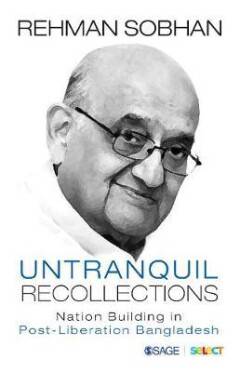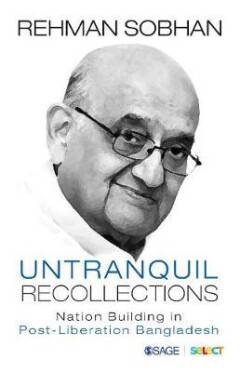
- Afhalen na 1 uur in een winkel met voorraad
- Gratis thuislevering in België vanaf € 30
- Ruim aanbod met 7 miljoen producten
- Afhalen na 1 uur in een winkel met voorraad
- Gratis thuislevering in België vanaf € 30
- Ruim aanbod met 7 miljoen producten
Zoeken
Untranquil Recollections
Nation Building in Post-Liberation Bangladesh
Rehman Sobhan
Paperback | Engels
€ 22,45
+ 44 punten
Uitvoering
Omschrijving
Rehman Sobhan was directly associated with Bangladesh's liberation struggle. In this memoir, he provides an insightful, first-hand account of the challenges faced by the newly independent Bangladesh in the early years of its existence. This book attempts to capture the unique problems of reconstructing the war-devastated economy while building institutions from ground up for a nation which for 24 years had been run through a highly centralized system of colonial-style governance.
Untranquil Recollections gives special attention to the author's involvement, as a Member of the Planning Commission, in addressing the problem of reconstruction while coping with the political challenges associated with building institutions, formulating economic policies and overseeing their implementation. The narrative attempts to identify the economic and political forces that were inimical to the radical direction of the national policy set by Prime Minister Sheikh Mujibur Rahman. The book concludes with a discussion of the dark events leading to Mujibur Rahman's assassination along with his family and his closest political colleagues, which resulted in a change in the regime.
Untranquil Recollections gives special attention to the author's involvement, as a Member of the Planning Commission, in addressing the problem of reconstruction while coping with the political challenges associated with building institutions, formulating economic policies and overseeing their implementation. The narrative attempts to identify the economic and political forces that were inimical to the radical direction of the national policy set by Prime Minister Sheikh Mujibur Rahman. The book concludes with a discussion of the dark events leading to Mujibur Rahman's assassination along with his family and his closest political colleagues, which resulted in a change in the regime.
Specificaties
Betrokkenen
- Auteur(s):
- Uitgeverij:
Inhoud
- Aantal bladzijden:
- 376
- Taal:
- Engels
Eigenschappen
- Productcode (EAN):
- 9789353887391
- Verschijningsdatum:
- 15/05/2021
- Uitvoering:
- Paperback
- Formaat:
- Trade paperback (VS)
- Afmetingen:
- 140 mm x 216 mm
- Gewicht:
- 476 g

Alleen bij Standaard Boekhandel
+ 44 punten op je klantenkaart van Standaard Boekhandel
Beoordelingen
We publiceren alleen reviews die voldoen aan de voorwaarden voor reviews. Bekijk onze voorwaarden voor reviews.











